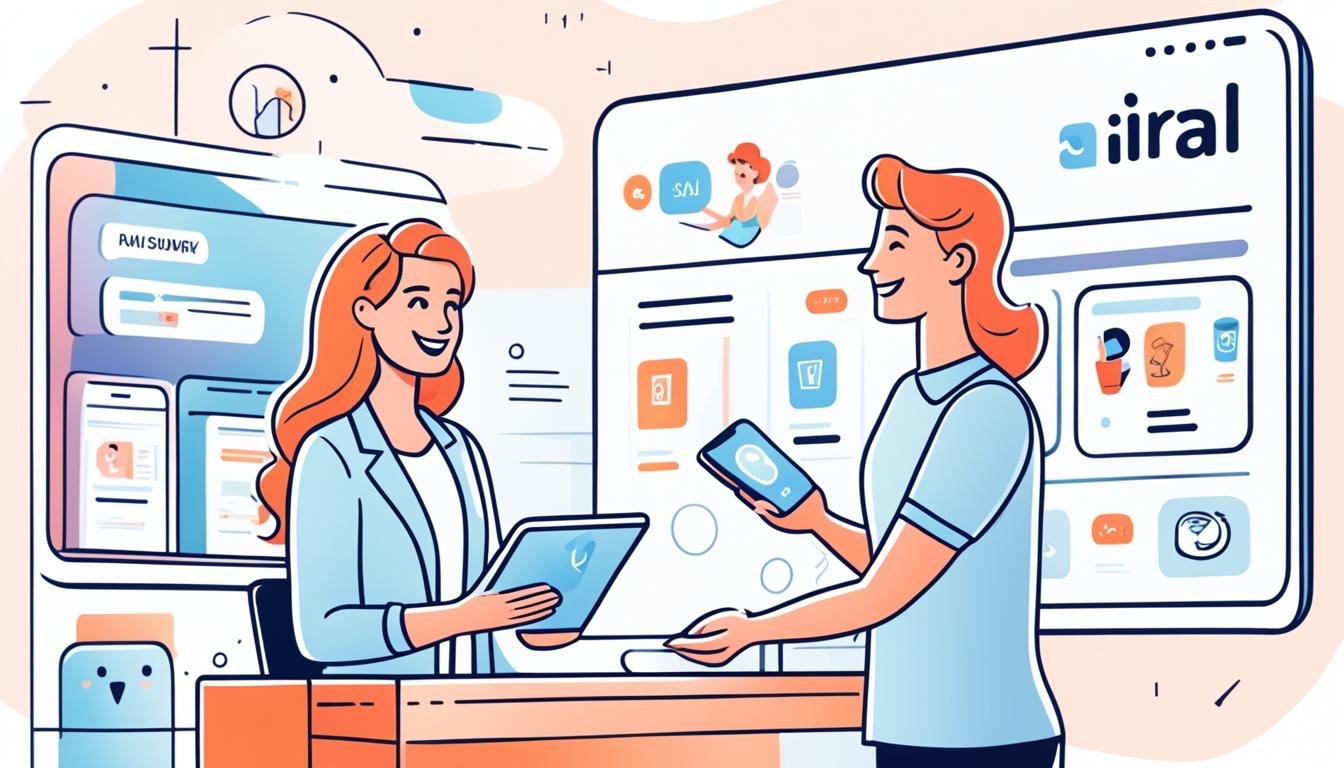How AI-Driven Personalization is Redefining Customer Loyalty in E-commerce
Ever noticed how online shops seem to know exactly what you want? This is thanks to AI-driven personalization! This tech is changing the game in e-commerce and how brands keep customers coming back. Let’s explore how AI uses data to make shopping more personal and engaging. You’ll see why 82% of companies use AI to boost customer happiness and sales.
AI-driven personalization is revolutionizing the way businesses approach customer loyalty in e-commerce. By leveraging vast amounts of customer data, AI algorithms can now predict preferences and tailor shopping experiences to individual needs. This level of personalization not only enhances customer satisfaction but also fosters long-term loyalty, as shoppers feel understood and valued. To fully capitalize on this trend, businesses must ensure they have the right infrastructure in place. Implementing advanced ecommerce development services can help create seamless, personalized shopping experiences that cater to unique customer journeys, driving both engagement and retention.
Key Takeaways
- 82% of organizations are using AI-powered personalization to elevate customer experiences in online retail.
- Customers highly value personalized product recommendations, with 67% considering it a critical purchase factor.
- 78% of customers are more inclined to repurchase from a brand that understands their preferences through personalized content.
- AI-driven email marketing strategies are being utilized by 87% of companies for better engagement.
- Real-time data integration is vital for delivering personalized recommendations and fostering loyalty in e-commerce.
Stay tuned as we dive into how AI affects customer loyalty, explore new e-commerce trends, and see how AI is changing online retail success.
Introduction to AI-Driven Personalization in E-commerce
Artificial intelligence (AI) has changed how businesses talk to customers in e-commerce. Now, e-commerce sites use advanced analytics and machine learning to give customers unique experiences. This makes customers more engaged and loyal.
AI tools help make marketing more precise and efficient. They analyze lots of data to make sure what customers get is just right for them.
The Importance of Personalization in E-commerce
Personalization is key for online stores today. It’s not just a nice-to-have; it’s a must-have. Using AI for personalized tips and deals can really boost sales and get more people to buy.
Amazon’s recommendation engine is a great example. It uses AI to look at what customers like and suggest products they might want. Walmart uses AI to predict what people will buy, helping them keep the right items in stock.
Overview of AI’s Role in Personalization
AI does more than just look at data in e-commerce. It helps change what customers see and suggest in real-time, making shopping smooth. Shopify’s Kit uses AI to handle ads, support, and stock, giving merchants tips that fit their stores.
AI also makes visual content more engaging and cuts down on returns. With visual search and image recognition, customers can find products by looking at pictures or using voice commands. This leads to more people buying things.
AI also helps with pricing, like in airlines and hotels. By changing prices based on demand and what others charge, businesses can sell more and make more money.
The future looks bright for AI in e-commerce. It will analyze data in real-time to change content and offers instantly. This will make shopping even more personal. AI will also help businesses rank higher in searches, bringing in more customers and sales.
The Impact of AI on Customer Loyalty
AI has changed how businesses keep customers loyal. Tools like predictive analytics and recommender systems make customer interactions better and more accurate. This makes loyalty programs work better.
60% of customers are willing to share their data for a better online experience. This lets AI use data from websites, social media, apps, and customer service. It creates a shopping journey that feels personal to each customer.
AI shines in making marketing campaigns super personal. Companies like Amazon, Netflix, and Spotify use AI to suggest products just for you. For instance, Amazon’s system learns what you like to buy, helping keep you coming back.
AI is key in keeping customers around. It uses predictive analytics to guess what you’ll buy next. This helps businesses tailor their loyalty programs just for you. AI puts customers into groups, so brands can talk to them in a way that really connects.
AI also makes loyalty programs better by changing them based on what customers do. This keeps the programs fresh and effective, making customers happier and more loyal.
AI helps with customer service too, through chatbots and virtual assistants. These tools make customers happier with their shopping experience. Companies using AI see big improvements in how they serve customers and keep them coming back.
Finally, AI helps with managing stock and setting prices. This means customers get offers that are just right for them. Predictive analytics help businesses keep the right amount of stock. This keeps customers happy and loyal.
The Data Backbone: Essential for AI Personalization
The key to great AI personalization in online stores is using real-time data well. By combining customer insights with product info, shops can make shopping super personal. This method is key to using artificial intelligence in retail fully.
Real-time Customer Data
Having real-time customer data is key for a personal shopping experience. Online stores use this data to make their offers better, which makes customers happier. They watch what customers look at, buy, and what they say to guess what they might like next.
Real-time Product Data
Real-time product data is just as important. It gives AI the info it needs to make spot-on recommendations. With detailed descriptions, great photos, and lots of reviews, AI can make sure every suggestion fits what the customer wants. This makes shopping smooth and personal.
As spending on AI in e-commerce is set to hit over $8 billion by 2024, using real-time data and insights is more important than ever. This focus on advanced data use not only makes shopping more personal but also boosts how well AI works in retail.
Generative AI’s Role in E-commerce Personalization
Generative AI is changing how we shop online by making content creation better. It uses customer data and trends to make content that fits what each shopper wants. This makes shopping more engaging and boosts sales.
Creating Personalized Content
Generative AI is great at making content that speaks to customers directly. It creates product descriptions and ads that feel personal. These messages change based on what customers do and say, making them more effective.
Big stores using this AI see happier customers and more repeat buyers. It also helps send the right message to the right person at the right time.
Enhancing Conversion Rates
Generative AI has a big effect on how many people buy things online. It lets stores change their ads quickly to see what works best. This means more people get involved and stores make more money.
Tools that let customers customize products with generative AI are changing the game. Stores see more customer interaction and offer more personalized products. This focus on personal shopping is why 81% of leaders use generative AI. It leads to better sales and keeps customers coming back.
Personalized Product Recommendations
In the world of online shopping, personalized product recommendations are key to a better shopping experience and keeping customers coming back. By using AI to make suggestions, companies can offer products that match what customers like and do. This greatly affects how customers make their choices.
The Power of Targeted Suggestions
Targeted suggestions are a big part of making shopping personal. McKinsey says personalized recommendations can boost sales by 20%. AI looks at what customers have bought before and what they’ve looked at. Then, it suggests products that fit their interests. This makes customers feel noticed and valued, which can lead to more sales.
Companies that use AI for product tips also see a big jump in sales. For example, Salesforce found a 26% increase in revenue for companies using AI for recommendations. This shows how important it is to use targeted suggestions in personalizing shopping.
Case Study: Sephora’s AI-Powered Recommendations
Sephora is a great example of how AI can improve shopping. They use AI to suggest products to customers, which helps customers make better choices and stay engaged. By looking at user data, Sephora’s AI gives personalized product tips that meet each customer’s unique needs.
This strategy has helped Sephora build strong customer relationships. Since 75% of shoppers prefer to buy from stores that know them, Sephora’s approach has made customers happier and more loyal. Sephora’s success shows how AI can change the retail game.
In conclusion, AI-powered recommendations and targeted suggestions are changing online shopping. They offer personalized experiences that keep customers coming back and increase sales. By following leaders like Sephora, companies can use AI to improve their personalization strategies. This leads to better customer choices and more revenue.
AI-Powered Chatbots: Personalized 24/7 Customer Service
AI chatbots have changed how online stores help customers 24/7. They make talking to customers easier and faster. They give answers that fit what customers need, making shopping better.
Natural Language Processing in Chatbots
Natural language processing (NLP) lets AI chatbots understand human language well. This tech helps chatbots answer complex questions and know how customers feel. Shopify’s AI chatbot, for example, changes its answers based on how customers feel, making them happier.
NLP is key for good chats. Alibaba’s AliMe uses many languages to help customers worldwide. This breaks language barriers and gives a personal touch to service.
Benefits of AI Chatbots for E-commerce
AI chatbots bring many benefits to online stores. For example, H&M’s chatbot helps customers 24/7. It makes sure questions get answered quickly and well, no matter the time.
- Enhanced User Experience: Chatbots give personal advice, like Amazon’s Alexa, which knows what you like to buy.
- Operational Efficiency: Stores like Zara use AI to predict what to stock, saving money and time.
- Customer Satisfaction: The North Face uses IBM’s Watson to help customers shop, making them happier and more engaged.
A report by McKinsey in early 2024 shows AI chatbots are big in marketing and sales. 65% of people use them. This has made customers happier and more loyal, which is good for online stores.
AI chatbots are changing e-commerce. They set new standards for helping customers and improving shopping online. As NLP gets better, these chatbots will make shopping even better for everyone.
Customer Segmentation and Micro-Segmentation
In e-commerce, customer segmentation and micro-segmentation are key for giving personalized experiences. With AI analytics, companies can split big customer groups into smaller ones. They look at things like age, what people like, and how they act. This helps make ads that really speak to people, making them more likely to buy.
For example, companies using market segmentation with AI have seen a 30% boost in ROI. These AI systems can quickly go through lots of data, cutting the time spent on segmenting in half. Also, using micro-segmentation has led to quicker updates and clearer categories, making decisions easier.
AI in customer segmentation does more than just save time. Companies like XYZ Corp saw a 35% jump in marketing engagement and a 25% increase in sales deals with an AI-driven platform. These tools help give personalized experiences and guide smart, data-based choices.
Plus, AI analytics helps create advanced e-commerce strategies based on micro-segmentation. By knowing exactly what customers want and how they act, companies can offer custom solutions. This targeted marketing is key in today’s fast-paced e-commerce world.
In short, using AI in customer and micro-segmentation changes e-commerce. It opens up new ways to give personalized experiences, increases engagement, and boosts ROI. As more businesses use AI, these advanced ways of segmenting will be key to their e-commerce strategies.
Dynamic Content Generation for Enhanced User Experience
In today’s e-commerce world, AI is changing how businesses talk to their customers. It uses smart algorithms to understand what users like and do. This makes shopping more personal for everyone.
Analyzing User Preferences
AI is great at figuring out what users want. It looks at lots of data, like who they are, what they buy, and what they like on social media. This helps businesses offer things that match what each customer wants.
Since most people start shopping online, this is really important. About 90% of shoppers look for products on digital platforms first.
Tailoring Website Content
After understanding what users like, AI changes website content to fit their needs. It can show certain products more, change descriptions, and make the site easier to use. This makes shopping better and keeps people coming back.
Studies show that personalized content can increase clicks by five times. It also makes customers happier and more loyal. With most browsing on mobiles, making websites work well on all devices is key.
This approach leads to a better online experience. It keeps customers engaged and happy with what they find. It’s all about meeting the needs of today’s online shoppers.
Boosting Customer Retention through Predictive Analytics
Predictive analytics is changing the game for keeping customers in e-commerce. It uses past data and insights to guess what customers will buy next. This helps businesses stay ahead of what customers want, keeping them loyal.
Forecasting Future Buying Patterns
Knowing what customers will buy next gives businesses an edge. By looking at past purchases and behavior, predictive analytics can guess future needs. For example, Starbucks uses this tech in its app to make customers happier and more loyal.
This way, companies can stock up on the right products and cut down on waste. It also makes shopping better for everyone.
Optimizing Marketing Strategies
Predictive analytics is key to making marketing better. It helps brands understand what customers want, making ads more effective. For instance, Amazon finds that personalized suggestions bring in 35% of its sales.
AI helps make messages that really speak to people, making them see the brand in a good light. This can make a big difference in how people feel about a brand.
Studies show that using predictive analytics and personalized marketing can bring in up to 8 times more return on investment. This highlights the importance of using AI for better marketing strategies.
Conclusion
The impact of AI innovation in e-commerce is huge. By using machine learning, e-commerce sites can deeply understand what customers want. They can offer products that match what customers like, making shopping better and more efficient.
With AI-powered chatbots and virtual assistants, e-commerce sites offer help any time of the day. These AI tools quickly answer many questions, getting better over time. This makes customers happier and more loyal, helping businesses keep them for a long time.
AI is also changing how e-commerce handles logistics and managing stock. It predicts what customers will want, helping stores keep just the right amount of stock. AI-driven logistics solutions make delivering orders faster and more reliable. All these changes are making online shopping better, offering a smooth and personal experience that leads to great success.
Source Links
- How AI Is Changing Ecommerce Personalization
- E-commerce 3.0: How Personalization and Artificial Intelligence Are Redefining the Online Shopping Experience
- AI-Powered Personalization in E-commerce
- AI in E-commerce Content Strategy – Copywriter Collective
- In What Ways Can AI and Machine Learning Transform Ecommerce Into Intelligent Solutions? – Successive Digital
- AI & Data Analytics: Redefining Customer Personalization
- Personalization at Scale: How AI is Transforming Customer Journeys in E-commerce
- The Evolution of AI in E-Commerce | XENA Intelligence
- What role does digital transformation play in enhancing customer experience through innovative business models?
- Why is Customization Essential in eCommerce Development for Enterprise Solutions? – Successive Digital
- Welcome to the World of Generative AI in E-Commerce – GrowthNatives
- Generative AI is Transforming Personalization
- Implementing AI for personalized product recommendations in online shopping
- AI Personalization in E-commerce: Discover 5 Key Advantages
- AI in E-commerce: Use Cases & Examples| Datrics
- AI for E-commerce and Customer Experience
- The Intersection of AI Chatbots and Ecommerce
- AI in eCommerce: Top 8 FAQs
- How AI is Redefining Customer Segmentation in 2024
- The rise of GenAI in eCommerce personalisation
- AI and Personalised Marketing: Enhancing Customer Experiences with Smart Data Use – Online Marketing Blog | Flow20
- AI in Marketing: The Future of Personalized Customer Experiences – StudioLabs
- How AI is Transforming Customer Experience for Businesses
- The Impact of AI and Automation on Customer Retention
- Enhancing Customer Retention with AI-Powered CRM
- Enhancing E-commerce Shopping Experiences Using AI.
- How is AI Driving eCommerce Success in Customer Experience?







